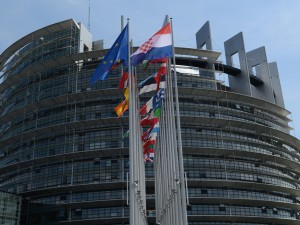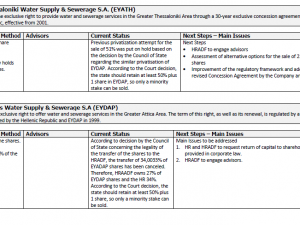
Article by M.Kanellopoulou, member of SAVEGREEKWATER, that was published in the site of the newspaper TO PONTIKI, regarding the truths and myths about decision making around EYATH and ERT in memoradum version of Greece.
The tender for the selling of Thessaloniki water company, EYATH, which takes place under media silence by (private) TV stations enters now in its second phase, after the TAIPED excluded “Citizens for Water“(the effort of cooperative management by Thessalonians together with the union workers). Mr. Stavridis, former president of the EYDAP (Athens Water Company) and now head of TAIPED (or HDRAF, the fund where all public assets were transferred in order to be sold), who is among the most eager supporters of free economy, especially when it is implemented by creating private monopolies under the supervision of “regulators”, in a monumental, for the lack of any legal or other documentation or explanation, letter ‘informs’ in an acquiescent tone that the Union’s proposal does not “pass” to the next phase. In the next phase, however, passes the French multinational Suez along with the even more willing Mr. Bobolas and even the public (!) Israeli company Mekorot’s joint venture with Mr. Apostolopoulos. The Union has already filed a complaint, as it was expected, and now we wait.
We wait furthermore for the implementation of the decisions of 17 municipalities from the region of Thessaloniki to hold local referendums and the signing of the relevant notorious presidential decree which enables this procedure, a decree which is characteristically “slow” in its legislative adventure, from Callicrates until today – how many years is it? – While overnight the institutional “father” of the Greek people signed with a stroke of a pen the abolition of ERT. Following the announced privatization of water, a few days ago, ” black” fell on all television, radio, internet and satellite programs of the public broadcaster.
It is a sad development in our effort to inform our fellow citizens over the dangers of privatization, since we were expecting the projection of a relevant documentary of the series “EXANDAS” by Y. Avgeropoulos, in the preparation of which we participated. This development is dangerous for another delicate reason, which falls in the category of our engagement with the wider concept of the commons. The archive of ERT, the ark of our modern cultural history, it is inconceivable for us to become an object of vulgar trade and such an act would signify the ultimate enclosure, beyond that of our natural collective goods such as water, of our collective intellect and our cultural heritage.
In both cases what we see is a palinode. The government blames the Troika and the European Commission and the Commission washes its hands regarding these decisions. I want to denounce the current government and especially their assistant political parties, who are opposed, as they claim, at the sale of EYATH (and the abolition of ERT) that they are moving on their own responsibility and to a future time hopefully liability in this sale, since there is an official letter from the European Commission that says they are not pushing our country in this direction. Why the Commission wrote this letter? They know that the pressure to privatize water services is unlawful, since they are bound by the TFEU to be neutral on issues of management of water services (Article 345 TFEU). So if the government is pressed, they have to admit it in public, to come forward and say that the European Commission is lying and we can all support them and go to the European courts. If the government is not pressed and simply lacks rationality and an understanding of the concept of public interest, there is another reason why they shouldn’t want the sale of water services. In the case of Athens even if sold at 350 million, ie the market value of our shares, the public sector’s shares, to the water company, tomorrow instead of collecting, the government should instead pay, since the company has receivables from the State, local authorities, etc., which mount up to 1.2 billion! (See Annual Financial Report 2012). As for the European Commission, they have no legitimacy to move forward with the privatization in the countries of the South, when we already have in our hands the first historically successful European Citizens’ Initiative right2water. Instead of playing hide and seek, they would do well to open directly processes to institutionalize the human right to access to clean water and hygiene, which was adopted in 2010 by the UN, as the proposed legislative initiative by the citizens suggest and abandon their desires for establishing a water market in Europe, desires rooting in the Steering group of Mr Barnier, a body composed of high ranking executives of the sector’s multinationals. The institutional role of Mr Barnier, although he fails to grasp it, is the European public interest and speculation on the basic needs of European citizens do not reflect it in the least.
Whether it is about our physical commons such as water, or our collective cultural heritage, one thing is certain. Each enclosure is directly or indirectly against the fundamental human right to life. Commons are not owned by any temporary elected representative.
Regardless of whether one agrees or not with the above, there is one point on which everyone would meet me upon: It is the responsibility of the Politeia (State) (Greek and European) to give an institutional way-out at the society’s will . If it cannot perform it, we have an ontological crisis as a political society, far more destructive than the much discussed economical.
Sign for your water in Greece and Europe.
Some figures: EYATH is a company with a monopoly on the supply of water in Thessaloniki area. It has profitability in 2012 of 24 million euros, available cash 33 million euros, equity of 135 million euros and annual income 74 million. The value of the stock is 220 million euros and the 75% that is held by TAIPED if sold in the market value which is 165 million euros, the investor will get his money back in six years and will obtain ownership of a company with monopoly rights. It is an investment that with current water prices has an 18% annual return on capital employed (33/135) and if the tarrifs are increased the return yields off.
Why “no” to privatization: What are the implications in our lives from the privatization of water services; What does international experience show? • sudden price increases of 250% – 300% with the partial privatization of EYATH. Prices x12 times in Bucharest over 13 years. Pacos de Ferreira Portugal 400% increase and 6% increase each year.• Degradation of water quality and uneven access to water services. In Walkerton (Ontario) Canada seven people lost their lives drinking water with bacteria E coli. Extensive infections with Suez in Johannesburg (South Africa). • Incomplete network maintenance & breaches of contractual terms for investments. In France, funding water services are still made by the public sector at 88%. In Argentina, the government terminated the contract with Suez for breach of its contractual obligations (maintenance and expansion of the network). • Monopolistic practices and cartels. The EU conducted research at SUEZ, VEOLIA and SAUR, for trusts in France (2012). In England companies right from the stage of the competition do not compete with each other and take to competitions without rival. • Lack of accountability and secret agreements. Most contracts remain secret eluding anyone control. In Berlin, the VEOLIA and RWE, in 1999, had demanded a written guarantee large profit was kept secret until the public in 2011 by referendum demanded to publicize the terms of the contract. Wherevere applied, water privatization has failed.
The international trend is the recovery of water services by public bodies (France, Canada, Argentina, Hungary). The Italians prevented water privatization with a referendum (2011). In the Netherlands water services is by law public (2004). In Germany, except in the case of Berlin, where developments of remunicipalization are underway, water management is done by public bodies.
*Ms Kanellopoulou is a founding member of the Initiative for the non privatization of water in Greece savegreekwater.org




